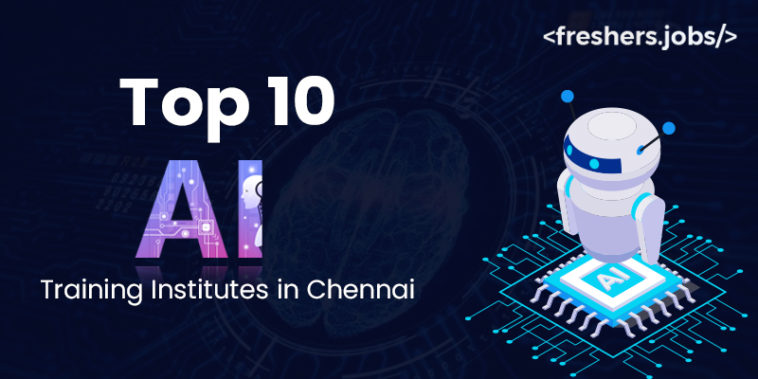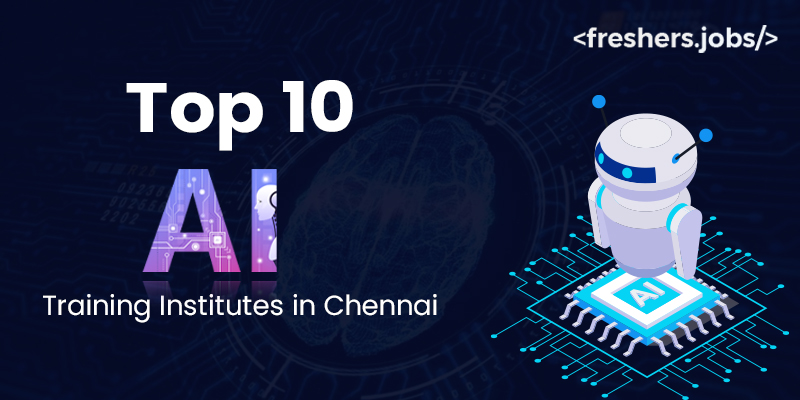Artificial Intelligence is a simulation that can perform tasks that typically need human intelligence, like learning, problem-solving, and decision-making. The need for Artificial Intelligence (AI) in the business world has been growing, and it is likely that this trend has continued or even accelerated. The demand for AI talent, including data scientists, machine learning engineers, and AI specialists, has surged as businesses seek to integrate AI technologies into their operations.
Additionally, AI-related skills are becoming increasingly important for professionals across various industries. Businesses must stay updated on AI trends and explore leveraging these technologies to gain a competitive advantage. We will explore the Top 10 Artificial Intelligence Training Institute in Chennai, its role in current business, merits, key aspects, and job opportunities.
Following is the list of the Top 10 Artificial Intelligence Training Institutes in Chennai.
- FITA Academy
- Simplilearn
- Intellipaat
- Edureka
- Besant Technologies
- BTree Systems
- Greens Technologys
- Softlogic Systems
- ACTE
- Shiksha
1. FITA Academy
FITA Academy, a distinguished training institute, provides an extensive range of 120+ courses, available both online and offline. Recognized for delivering essential technical and professional certifications, the academy consistently maintains a prominent position in the industry. With a team of more than 1000 trainers boasting decades of experience, the institute has positively impacted the learning journeys of more than 75,000 individuals. By establishing multiple branches in Bangalore, Pondicherry, Coimbatore, and Madurai, the academy reaffirms its commitment to delivering top-notch training. This strategic expansion ensures that individuals in various regions have access to high-quality training opportunities.
Why choose the AI Course in Chennai at FITA Academy?
FITA Academy provides a thorough Artificial Intelligence Course in Chennai that covers fundamental to advanced-level concepts, including Machine Learning and Deep Learning. The curriculum starts with comprehensive training in the Python programming language before delving into Machine Learning and exploring models and algorithms. Participants will gain knowledge of Tensorflow and engage in real-time Capstone Projects before receiving the course completion certificate. The curriculum, crafted by industry experts at FITA Academy, ensures students are equipped with modern tools and technologies in Artificial Intelligence. The academy ensures accessibility by offering flexibility in batch schedules, accommodating both weekend and weekday class options. Additionally, participants who complete the training are qualified to receive placement support.
Customized Syllabus of AI Training in Chennai
The curriculum for Artificial Intelligence Training in Chennai extensively covers fundamental principles, utilization of Python for Machine Learning, insights into Data Science, Python insights, handling Lists, Ranges & Tuples, Python Dictionaries and Sets, Input and Output in Python, Python functions, Exceptions Handling, and Regular Expressions. Students acquire proficiency in Data Manipulation, comprehension of Machine Learning Models, Machine Learning Algorithms, exploration of Supervised Learning Algorithms, and Unsupervised Learning Algorithms. Additionally, they receive guidance on Understanding Hypothesis Testing, Implementing Deep Learning Using TensorFlow, Setting Up Deep Learning Environment, Exploring Tensorflow, and Constructing Neural Networks. The advanced segments encompass Understanding Convolutional Neural Networks (CNN), Recurrent Neural Networks (RNN), and Recursive Neural Networks. This comprehensive curriculum ensures a profound understanding of Artificial Intelligence, equipping students to tackle real-world networking challenges.
Expert Trainers for the Artificial Intelligence Course in Chennai
Highly skilled trainers lead FITA Academy’s Artificial Intelligence Training in Chennai, bringing substantial hands-on experience from the industry. These instructors are committed to imparting theoretical knowledge while sharing valuable real-world insights with students, ensuring they stay updated on the recent industry trends for comprehensive preparation in this dynamic field.
Project Presentation Sessions
An integral feature of FITA Academy’s Artificial Intelligence Course in Chennai is project presentation sessions. Recognizing the importance of practical experience in mastering Artificial Intelligence and preparing for a successful career, these sessions allow students to apply acquired knowledge and principles in real-world scenarios, providing invaluable hands-on exposure.
Complimentary Placement Sessions
FITA Academy is dedicated to delivering comprehensive Artificial Intelligence Training in Chennai that extends beyond the classroom. The institute equips students for the competitive job market through complimentary placement sessions, covering essential aspects such as resume building, refining interview skills, job placement assistance, and career guidance. These thoughtfully designed sessions aim to assist students in achieving their career objectives. With an extensive network of 1,500+ partner companies, FITA Academy facilitates job placements for graduates, offering diverse opportunities within the industry. This extensive network ensures students have access to promising career prospects, facilitating a smooth and successful transition into the professional world.
2. Simplilearn
Simplilearn stands out as a well-regarded online platform providing a flexible Artificial Intelligence Course covering fundamental to advanced concepts. While the institute offers a comprehensive range of courses, the primary focus on online learning may limit direct interaction between learners and trainers, potentially leading to higher costs.
3. Intellipaat
Intellipaat specializes in delivering Artificial Intelligence Classes suitable for both beginners and advanced learners, featuring a curriculum enriched with valuable learning materials. However, the strong emphasis on online classes may affect the extent of direct interaction between instructors and students, and the course cost could be relatively higher compared to alternative institutes.
4. Edureka
Edureka concentrates on providing Artificial Intelligence Courses focusing on Machine Learning, aiming to enhance skills and impart valuable industry knowledge. The predominant emphasis on online courses may reduce direct interaction between learners and trainers, making it potentially less favorable for those seeking a more in-depth learning experience.
5. Besant Technologies
Besant Technologies offers comprehensive Artificial Intelligence Classes with real-time assistance. Despite providing extensive facilities, it may not be the preferred choice for individuals seeking a more profound learning experience.
6. BTree Systems
BTree Systems specializes in offering tailored Artificial Intelligence Courses designed to meet industry-specific requirements. However, their placement support might not be as comprehensive compared to certain other institutes.
7. Greens Technologys
Greens Technologys provides an extensive Artificial Intelligence course, equipping learners with essential skills. However, this course may not be the ideal choice for those seeking a more extensive and in-depth learning experience compared to other institutes.
8. Softlogic Systems
Softlogic Systems is known for providing specialized Artificial Intelligence Classes tailored to industry-specific needs. However, the practical training aspect may not be as comprehensive compared to other institutes.
9. ACTE
ACTE specializes in delivering comprehensive Artificial Intelligence Classes covering a range of concepts. While offering these benefits, the level of placement support provided might be relatively less extensive compared to certain other institutes.
10. Shiksha
Shiksha offers Artificial Intelligence courses with a focus on imparting essential skills. It’s worth noting that the practical training component may not be as extensive as some other institutes.
Freshers Jobs meticulously selected these institutes after a thorough research, considering factors such as brand reputation, student feedback, and a proven track record of student achievements.
Role of Artificial Intelligence in Modern Business
Artificial Intelligence plays a vital role in modern business by revolutionizing various aspects of operations and decision-making. One key contribution is in data analysis and interpretation. AI algorithms can swiftly process vast amounts of data, extracting meaningful insights and patterns that might be challenging for human analysts. This enhances strategic decision-making by providing businesses with a data-driven approach. AI is instrumental in improving customer experiences. AI-powered chatbots are deployed for customer service, offering instant and personalized responses to inquiries. Machine learning algorithms analyze customer behavior, enabling businesses to tailor their offerings and marketing strategies. This personalized approach enhances customer satisfaction and fosters brand loyalty. AI technologies streamline repetitive tasks in automation, enabling employees to concentrate on more complex and innovative tasks.
Robotic Process Automation (RPA) is employed for tasks like data entry and processing, minimizing errors and increasing operational efficiency. AI is also a cornerstone in predictive analytics, aiding businesses in forecasting trends and outcomes. This is particularly valuable in supply chain management, where AI helps optimize inventory levels and distribution networks. AI-powered predictive analytics contributes to more accurate sales forecasting and risk management. AI is utilized for threat detection and prevention. Machine learning algorithms can identify unusual patterns in network traffic, detect potential security breaches, and mitigate risks in real time. This proactive approach is crucial in safeguarding sensitive business information. The role of AI in modern business is multifaceted. It transforms data into actionable insights, enhances customer interactions, streamlines operations through automation, facilitates predictive analytics, and fortifies cybersecurity measures. As businesses embrace AI technologies, they gain a competitive edge by adapting to the demands of a data-driven and technologically advanced marketplace.
What is Artificial Intelligence (AI)?
Artificial Intelligence (AI) involves machines that are programmed to simulate human intelligence, enabling them to think, learn, and execute tasks that typically demand human cognitive abilities. AI aims to develop systems that can perform tasks that would generally require human intelligence, such as visual perception, speech recognition, decision-making, and language translation. AI comprises a range of technologies and methodologies, such a natural language processing, machine learning, computer vision, & robotics. Machine learning, a subset of AI, involves training algorithms on large datasets to recognize patterns and make predictions or decisions without explicit programming. This enables AI systems to improve their performance over time through experience.
There are 2 main types of AI:
- Narrow or Weak AI: This type of AI is designed & trained for a specific task. It excels in performing a particular function, such as image recognition or language translation, but needs more general cognitive abilities.
- General or Strong AI: This is a more advanced form of AI that can understand, learn, and apply knowledge across a broad range of tasks, similar to human intelligence. General AI has yet to be achieved and remains a subject of ongoing research & speculation.
AI applications are widespread and can be found in various industries, including healthcare, finance, education, entertainment, and more. Examples include:
- Virtual personal assistants (like Siri or Alexa).
- Recommendation systems (like those used by streaming services).
- Autonomous vehicles.
- Medical diagnosis tools.
While AI holds great promise for improving efficiency and solving complex problems, it also raises ethical and societal concerns, such as job displacement, algorithm bias, and the responsible use of AI in decision-making processes. As technology advances, AI continues to evolve, with ongoing research and development pushing the boundaries of what machines can achieve.
Merits of Artificial Intelligence
Efficiency and Automation
- AI enables automation of repetitive tasks, reducing the burden on human resources and increasing operational efficiency.
- Robotic Process Automation (RPA) allows machines to perform rule-based tasks, improving accuracy and speed.
Data Analysis and Insights
- AI systems can process & analyze vast amounts of data quickly, extracting meaningful insights and patterns that may be challenging for humans to discern.
- Predictive analytics powered by AI aids in forecasting trends and making informed business decisions.
Improved Decision-Making
- AI algorithms can analyze complex datasets, providing valuable information for decision-making in various fields, including finance, healthcare, and marketing.
- Machine learning models can adapt and improve their decision-making capabilities over time based on new data.
Enhanced Customer Experiences
- AI-powered chatbots and virtual assistants provide instant and personalized responses to customer inquiries, improving the overall customer experience.
- AI-driven personalization in marketing enhances customer engagement by tailoring content and recommendations.
Innovation and Creativity
- AI technologies foster innovation by automating routine tasks, enabling human workers to focus on more creative and complex aspects of their work.
- Generative AI models can create new and original content, such as art, music, and literature.
Medical Applications
- AI aids in medical diagnosis by analyzing medical images, predicting disease outcomes, and identifying patterns in patient data.
- Drug discovery processes are accelerated through AI algorithms that analyze molecular structures and identify potential compounds.
Safety and Security
- AI is used in cybersecurity to detect and prevent cyber threats by analyzing patterns in network traffic and identifying anomalies.
- Autonomous vehicles leverage AI for real-time decision-making, enhancing road safety.
Language Translation and Natural Language Processing
- AI-powered language translation services enable communication across different languages, facilitating global collaboration.
- Natural Language Processing (NLP) allows machines to understand and generate human-like language, improving user interactions.
Efficient Resource Utilization: AI can optimize resource allocation in various industries, including energy, manufacturing, and transportation, leading to cost savings and reduced waste.
Accessibility and Inclusivity: AI technologies contribute to creating accessible solutions for individuals with disabilities, improving inclusivity in various digital interfaces.
Key Components of Artificial Intelligence
Machine Learning (ML)
- Supervised Learning: Models undergo training on labeled data, wherein the algorithm predicts outcomes based on input-output pairs.
- Unsupervised Learning: Algorithms learn patterns and relationships in unlabeled data without predefined outputs.
- Reinforcement Learning: Agents learn through trial and error by receiving consequences, either positive or negative, based on their actions.
Natural Language Processing (NLP): NLP enables machines to understand, interpret, and generate human language. It includes text analysis, sentiment analysis, and language translation.
Computer Vision: Computer vision involves teaching machines to interpret & understand visual information from the world, including image and video recognition, object detection, and facial recognition.
Neural Networks: Neural networks serve as computational models inspired by the human brain. Within machine learning, deep learning, a subset, employs neural networks with several layers (deep neural networks) to grasp intricate representations.
Expert Systems: Expert systems mimic the decision-making capabilities of a human expert within a particular domain. They use knowledge representation and inference engines to conclude.
Speech Recognition: Speech recognition technology allows machines to convert spoken language into written text. It is used in applications like voice assistants and transcription services.
Robotics: The integration of AI into robotics enables machines to perceive their surroundings, make decisions, and execute tasks. AI-driven robots can adapt to changing conditions and interact with their surroundings.
Knowledge Representation: Knowledge representation involves capturing information in a format that machines can utilize to solve problems, make decisions, and perform tasks.
Planning and Decision Making: AI systems can plan and make decisions based on available information. This involves algorithms that weigh options and select the most suitable action.
Genetic Algorithms: Inspired by natural selection, genetic algorithms are optimization algorithms that evolve solutions over multiple generations, selecting the fittest solutions for a given problem.
Machine Perception: Machine perception enables machines to perceive and interpret sensory data, such as understanding visual, auditory, or tactile information.
Cognitive Computing: Cognitive computing combines various AI technologies to mimic human thought processes, including reasoning, learning, problem-solving, and understanding natural language.
AI Chips and Hardware: Specialized hardware, such as Graphics Processing Units (GPUs) and Tensor Processing Units (TPUs), is designed to accelerate AI computations, particularly in deep learning tasks.
Ethical and Explainable AI: Consider ethical principles in AI development and developing systems that explain their decisions transparently.
Job Opportunities in the Artificial Intelligence Field
- AI/ML Intern: Their responsibilities may include data preprocessing, model training, and basic algorithm implementation. They often involve assisting with ongoing projects and gaining hands-on experience.
- Junior Data Scientist: Their responsibilities involve working with datasets, performing basic analysis, and supporting the development of machine learning models. They collaborate with senior data scientists and engineers.
- AI Research Assistant: AI Research Assistants work on research projects & literature reviews and support the development of experimental models. They often involve collaboration with senior researchers and scientists.
- Data Scientist: They develop and implement machine learning models for data analysis. They are responsible for extracting insights and presenting findings to support business decisions.
- Machine Learning Engineer: They focus on designing and deploying scalable machine learning systems. Their responsibility involves optimizing algorithms for performance and working with data pipelines.
- AI Developer: They work on developing AI applications, including software design and coding. They collaborate with cross-functional teams to integrate AI into various products.
- Senior Data Scientist: Senior Data Scientists lead and mentor a team of data scientists. They play a key role in developing advanced analytical solutions and models.
- Principal Machine Learning Engineer: A Principal Machine Learning Engineerprovides strategic direction in developing machine learning infrastructure. They lead the design and implementation of complex ML systems.
- AI Architect: They design and oversee the implementation of AI solutions across an organization. They collaborate with executives to align AI strategies with business objectives.
- Director of AI Research: The Director of AI Researchleads a team of researchers in exploring advanced AI concepts and applications. They shape the long-term AI strategy for the organization.
- Chief AI Officer (CAIO) or Chief Data Officer (CDO): They provide executive leadership in defining and executing the AI strategy. They ensure that AI initiatives align with overall business goals.
- AI Ethicist or AI Governance Specialist: AI Ethicist/ AI Governance Specialists focus on ethical considerations in AI development and deployment. They shape policies and guidelines for responsible AI use.
- AI Product Manager: They oversee the development and enhancement of AI-powered products. Collaborating with cross-functional teams, they define product roadmaps.
- AI Consultant: AI Consultantswork with clients to understand their business needs and provide AI solutions. They offer expertise in implementing AI strategies.
The dynamic surge in demand for Artificial Intelligence (AI) within the business landscape reflects the transformative impact of this cutting-edge technology. As industries worldwide race to harness the power of AI, the need for skilled professionals in areas such as data science and machine learning has skyrocketed. This trend is not merely a fleeting phenomenon; it appears to be an enduring force propelling businesses toward a future imbued with intelligent automation and data-driven decision-making. We discussed the Top 10 Artificial Intelligence Training Institute in Chennai. We also examined the role of Artificial Intelligence in today’s business world, its significance, key components and available job opportunities.




